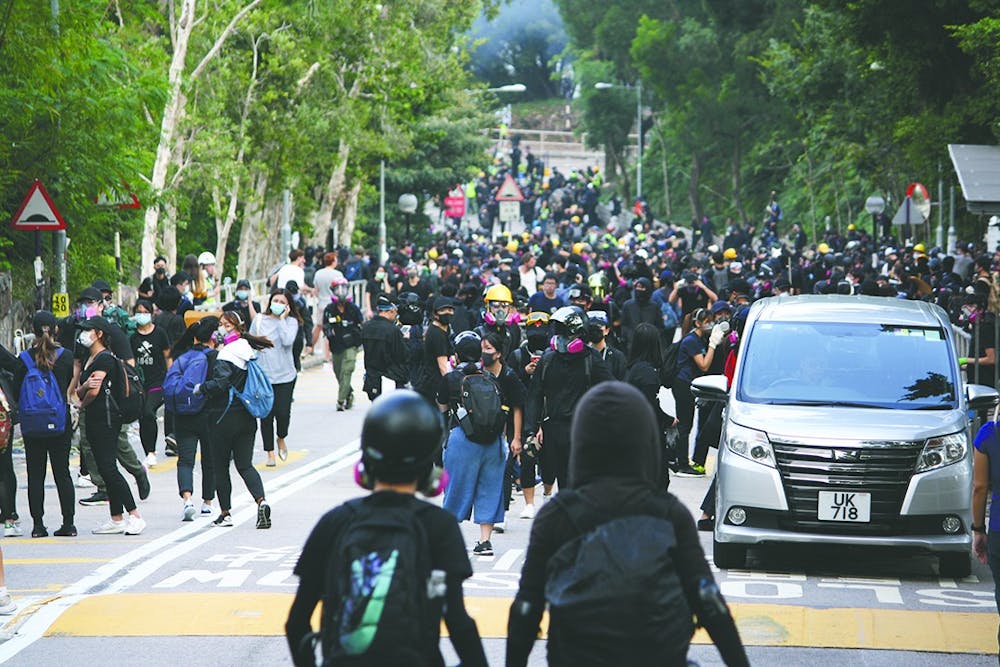Fourth-year international business and operations and supply chain student Madison Mueller escaped her university in Hong Kong on "a dirt path lined with wooden planks used by maintenance" to get to the airport. Every other way out was blocked by protesters, roadblocks and barricades. She then took a taxi to the airport.
"Before the taxi arrived some men offered us beers in glass bottles, and, since we had all had ourselves quite a day, we took them," Mueller said in an email interview. "Later on we were told that they wanted us to drink them so they could use the bottles to make Molotov cocktails."
The recent escalation of events on the Chinese University of Hong Kong (CUHK) campus led to an early evacuation of all USC students participating in the Darla Moore School of Business international business and Chinese enterprise program.
First aware of the protests in June, the Study Abroad Office had been actively monitoring the situation and directing students to avoid the demonstrations. A team of faculty from this office, Darla Moore and the university’s Student International Travel Oversight Committee was formed to develop contingency plans in case of increased unrest and to ensure frequent communication was available.
“We were in touch with students regularly to pass on advice and resources, and to remind them that they could always contact us if they felt uncomfortable or unsafe,” Morgan Inabinet, the assistant director of Global Health, Safety and Security, said in an email interview.
Fourth-year international business student Lydia Ditzenberger said these generalized reports were based only on information USC had from safety connections and lawyers. She said although the school was trying its best, the efforts were not helpful due to their secondhand nature. As such, Ditzenberger and her peers relied heavily on various social media platforms to stay up to date with smaller demonstrations and more localized events.
“It was interesting being a student in the area of conflict,” said Sandra Boyle, a second-year international business and finance student, in an email interview. “No matter how much we cared about Hong Kong and their fight for democracy, we could always go home to safety. Our peers couldn’t. Hong Kong was their home. So we always felt as if we were bystanders on a massive conflict. Just watching but could not truly participate.”
Throughout the summer and into the beginning of the fall semester, clashes between protesters and police remained largely within the city center. Carolina students went about their day-to-day lives and attended classes, but aware of growing tensions, still exercised caution when visiting the metropolitan area.
“Honestly I never felt like I was in too much danger until the protests moved to my campus," Mueller said. "This was true for most of our time there; we were almost always safe if we just stayed on campus. Obviously within the past two weeks that all changed though."
Following the death of student Chow Tsz-lok and the police shooting of a protester at point-blank range, the weekend of Nov. 9 saw universities in Hong Kong become the primary sites of confrontation. On the campus of CUHK, Ditzenberger remembered the view from her friend’s residential building and experiencing the effects of tear gas herself from the excessive amount of chemicals in the air and water system.
“That’s kind of when it clicked in my head, ‘Oh, this is actually crazy,’ as you just see all the tear gas continually being fired, all the fires that were starting and just kind of seeing the police move back and forth and pushing the protesters," Ditzenberger said. "Later that evening, when I went back up to my dorm, we saw the water cannon actually come in and spray the students and the president of [CUHK].”
By the second day of CUHK rioting, the Study Abroad Office emailed students notifying them of their removal from the city.
USC students purchase university-provided insurance before studying internationally. After the evacuation notice, the insurance company arranged for earlier flights, but Mueller said it “failed miserably” in its ability to organize transportation.
Boyle said the agency could not get the students off campus because cars could not reach them due to barricades and roadblocks. Boyle and Ditzenberger said they had similar experiences getting off campus, having used a "mountain path" or “grassy trail” to get to a main road.
Officials at USC were surprised to find students already at the airport once insurance transport had been arranged and finalized. P. Allen Miller, vice provost and director of Global Carolina, said the miscommunication was the result of students’ immediate safety concerns, compounded by the fast pace of events at CUHK.
“It’s easy to underestimate how difficult that 12-hour time difference is because, you know, we’re talking to the insurance company at two o’clock in the afternoon, it’s two in the morning over there, and vice versa," Miller said. "[The students] may have heard something twelve hours before we were able to actually talk to the insurance company and get it sorted out.”
Inabinet said students’ change fees, alternate transportation costs and airport meals will be covered by insurance.
USC has suspended all study abroad programs in Hong Kong for next semester. Options to remain on campus or travel to an alternate location were provided to students, and all programs in mainland China are still operating as normal, according to Chrissie Faupel, assistant director of Study Abroad Advising. She said relationships with Hong Kong partners are still strong and USC is "thinking of them during this period of upheaval."

